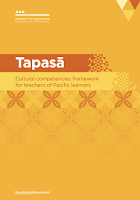Wednesday, 5 June 2019
Vocabulary and non-fiction texts
As a part of trying to increase reading comprehension, I am exposing my students to more non-fiction texts and explicitly teaching the vocabulary from those texts.
Tuesday, 4 June 2019
Monday, 3 June 2019
Unpacking Tapasa #1
Reposted with permission from Robyn Anderson.
Unpacking Tapasa #1
Last night our staff worked with Jeremiah Tauti to unpack the aims of the Tapasa Cultural Competencies Framework. Unpacking a document together means we gain a shared understanding as we implement the best practise suggestions. Enhancing teacher perspectives so that students of all cultures feel recognised and valued in their learning environment will help us to avoid the cultural dissonance many Pasifika students may have experienced, regardless of where they are in their learning journey. Strengthening connections with families through Talanoa will help us to be culturally responsive practitioners.
Our homework is to reflect on our own understandings of the following questions
1. How does your classroom reflect your student body?
2. How do you involve family?
3. How do you create space for difficult conversations about current events and culture?
4 . How do you help students develop a positive cultural identity?
5. Where are the gaps in my knowledge and practise in terms of cultural responsiveness?
Our homework is to reflect on our own understandings of the following questions
1. How does your classroom reflect your student body?
2. How do you involve family?
3. How do you create space for difficult conversations about current events and culture?
4 . How do you help students develop a positive cultural identity?
5. Where are the gaps in my knowledge and practise in terms of cultural responsiveness?
Saturday, 1 June 2019
Learning vs Retention
This is just a not-yet-investigated observation. Throughout my teacher training and additional post graduate study, the focus was always on learning. How do we get kids to learn more efficiently? Out of this research, education researchers have learned many ways on how to possibly increase the uptake of knowledge and skill. I say "possible" because ultimately any study that is limited to not allowing a negative control, as many education studies are (it is unethical to withhold a possible boon to one group of people), is flawed.
One of the issues I have with the children at my current school is that while they learn well enough, they don't retain anything beyond the day, week, or fortnight from learning. One of the core understandings from neuroscience is that repetition strengthens newly formed pathways, leading to long term memorisation. So have education researchers been so focussed on trying to learn new things faster that they've neglected to look into the retention of information?
When I first heard that homework had been deemed an ineffective learning tool during teacher training, alarm bells went off in my head. They still do when people say this. I understand that "homework" consisting of learning new academic ideas without the teacher or an expert present is a poor way to learn new things. However if no one did homework, then when are children supposed to practise the skills and knowledge they've learned to become proficient at the new skill? I also hear a lot about the adults of tomorrow needing to be more creative. Where is the working memory to be creative going to come from if it's being used to handle the cognitive load from an unpractised skill?
It seems to me that many education researchers and teachers are aiming for the stars and forgetting that a tried and tested rocket is needed to get out there first.
One of the issues I have with the children at my current school is that while they learn well enough, they don't retain anything beyond the day, week, or fortnight from learning. One of the core understandings from neuroscience is that repetition strengthens newly formed pathways, leading to long term memorisation. So have education researchers been so focussed on trying to learn new things faster that they've neglected to look into the retention of information?
When I first heard that homework had been deemed an ineffective learning tool during teacher training, alarm bells went off in my head. They still do when people say this. I understand that "homework" consisting of learning new academic ideas without the teacher or an expert present is a poor way to learn new things. However if no one did homework, then when are children supposed to practise the skills and knowledge they've learned to become proficient at the new skill? I also hear a lot about the adults of tomorrow needing to be more creative. Where is the working memory to be creative going to come from if it's being used to handle the cognitive load from an unpractised skill?
It seems to me that many education researchers and teachers are aiming for the stars and forgetting that a tried and tested rocket is needed to get out there first.
Back to phonics for me
Phonics, decoding, and spelling; a brief overview of our programme being instituted in the class.
Place Value rears its ugly head again.
See this blog post on me having to teach Place Value again, this time successfully.
Subscribe to:
Comments (Atom)


